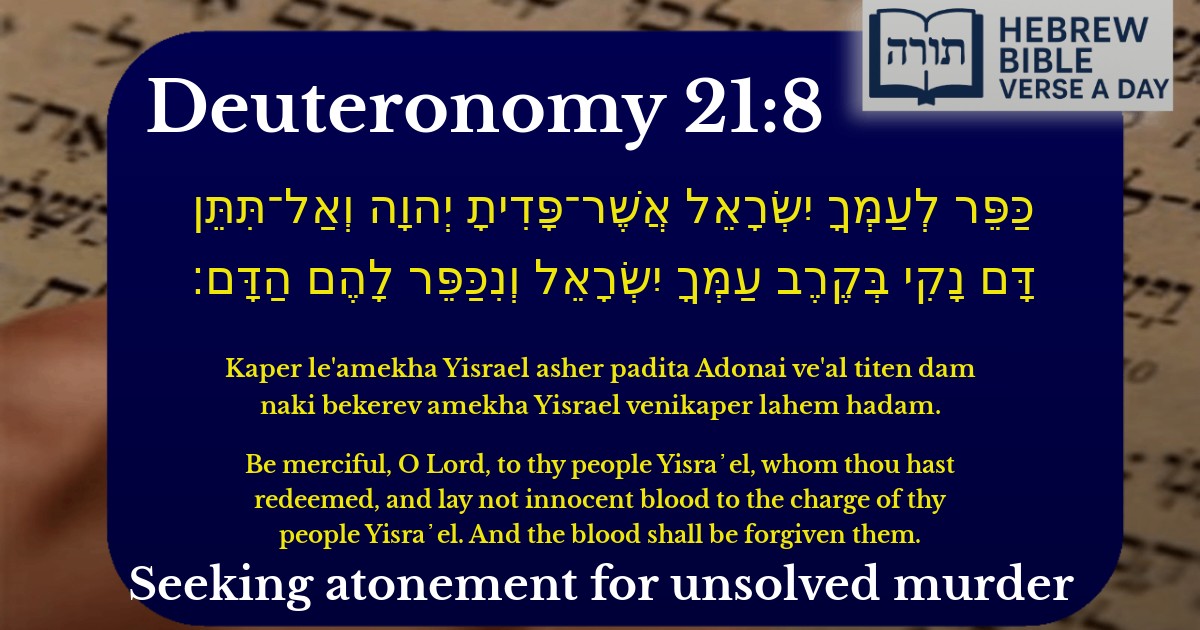Join Our Newsletter To Be Informed When New Videos Are Posted
Join the thousands of fellow Studends who rely on our videos to learn how to read the bible in Hebrew for free!
Hebrew Text
כַּפֵּר לְעַמְּךָ יִשְׂרָאֵל אֲשֶׁר־פָּדִיתָ יְהוָה וְאַל־תִּתֵּן דָּם נָקִי בְּקֶרֶב עַמְּךָ יִשְׂרָאֵל וְנִכַּפֵּר לָהֶם הַדָּם׃
English Translation
Be merciful, O Lord, to thy people Yisra᾽el, whom thou hast redeemed, and lay not innocent blood to the charge of thy people Yisra᾽el. And the blood shall be forgiven them.
Transliteration
Kaper le'amekha Yisrael asher padita Adonai ve'al titen dam naki bekerev amekha Yisrael venikaper lahem hadam.
Hebrew Leining Text
כַּפֵּר֩ לְעַמְּךָ֨ יִשְׂרָאֵ֤ל אֲשֶׁר־פָּדִ֙יתָ֙ יְהֹוָ֔ה וְאַל־תִּתֵּן֙ דָּ֣ם נָקִ֔י בְּקֶ֖רֶב עַמְּךָ֣ יִשְׂרָאֵ֑ל וְנִכַּפֵּ֥ר לָהֶ֖ם הַדָּֽם׃
כַּפֵּר֩ לְעַמְּךָ֨ יִשְׂרָאֵ֤ל אֲשֶׁר־פָּדִ֙יתָ֙ יְהֹוָ֔ה וְאַל־תִּתֵּן֙ דָּ֣ם נָקִ֔י בְּקֶ֖רֶב עַמְּךָ֣ יִשְׂרָאֵ֑ל וְנִכַּפֵּ֥ר לָהֶ֖ם הַדָּֽם׃
🎵 Listen to leining
Parasha Commentary
📚 Talmud Citations
This verse is quoted in the Talmud.
📖 Yoma 85b
The verse is referenced in the discussion about atonement and the power of repentance, particularly in the context of Yom Kippur.
📖 Makkot 11b
The verse is cited in the discussion about the laws concerning the cities of refuge and the atonement for unintentional murder.


Context of the Verse
This verse appears in Devarim (Deuteronomy) 21:8, within the passage discussing the eglah arufah (the heifer whose neck is broken) as an atonement for an unsolved murder. The elders of the nearest city perform this ritual to seek atonement for the innocent blood shed in their midst.
Meaning of "כַּפֵּר לְעַמְּךָ יִשְׂרָאֵל"
Rashi explains that the phrase "כַּפֵּר לְעַמְּךָ יִשְׂרָאֵל" ("Be merciful, O Lord, to Thy people Yisrael") is a plea for atonement. The elders, representing the community, beseech Hashem to forgive the collective responsibility for the unsolved murder, as the Torah holds the nearest city accountable for failing to provide proper hospitality and security (Rashi on Devarim 21:8).
The Concept of "דָּם נָקִי" (Innocent Blood)
The term "דָּם נָקִי" ("innocent blood") refers to the blood of a victim whose killer remains unknown. The Rambam (Hilchos Rotzeach 9:3) emphasizes that this ritual serves as a public declaration that the community did not neglect its duty to protect travelers. The Sifrei (Devarim 21:8) adds that the atonement is necessary to prevent the land from being spiritually defiled by unavenged bloodshed.
Redemption and Atonement ("אֲשֶׁר־פָּדִיתָ יְהוָה")
The mention of "אֲשֶׁר־פָּדִיתָ יְהוָה" ("whom Thou hast redeemed") recalls the Exodus from Egypt. The Ibn Ezra notes that this phrase reminds the people of their covenantal relationship with Hashem—just as He redeemed them from slavery, they must now seek His mercy to cleanse them from the spiritual stain of bloodshed.
The Outcome of Atonement ("וְנִכַּפֵּר לָהֶם הַדָּם")
The concluding phrase, "וְנִכַּפֵּר לָהֶם הַדָּם" ("And the blood shall be forgiven them"), teaches that the eglah arufah ritual brings expiation. The Talmud (Sotah 47b) states that once this procedure is completed, the community is no longer held accountable for the unsolved murder, demonstrating the power of collective repentance and Divine compassion.
Key Lessons from the Verse